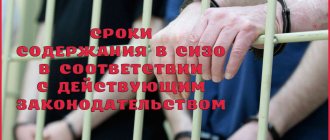- What are the preventive measures?
- In what cases can the term of imprisonment be increased?
- Maximum period of detention during the investigation stage
- Maximum term of detention at the stage of consideration of a criminal case
- What to do if prison terms are delayed?
It is a well-known fact: detention is the most severe preventive measure, implying a significant restriction of constitutional rights and freedoms of a person.
What are the preventive measures?
The fact is that this preventive measure presupposes not only the deprivation of a person’s freedom, but also his complete isolation from other citizens. For example, the current Code of Criminal Procedure of the Russian Federation, in addition to detention, provides for two more preventive measures that are associated with the isolation of the accused (suspect): a ban on certain actions with a restriction on leaving the premises and house arrest. But these preventive measures are, without a doubt, much milder than detention, since the prohibition of certain actions implies only partial isolation of citizens, consisting in the inability to leave their housing at a time determined by the court, and house arrest, although it consists of complete isolation, however, the citizen is kept in his own home and can communicate with family members and other persons living with him, unless a separate ban is established in this part by the court.
Despite the fact that Article 108 of the Code of Criminal Procedure of the Russian Federation allows for the placement of citizens in pre-trial detention centers in exceptional cases, the courts are formally concerned with establishing the real fact of the existence of grounds for choosing this preventive measure, and in fact, detention still remains preventive measure No. 1 in Russia. In the vast majority of cases, the court decides to detain the accused solely due to the gravity of the charge. Moreover, the term of detention is often extended solely due to the gravity of the charge, although this is directly prohibited by the clarifications of the Supreme Court of Russia. Thus, according to paragraph 21 of the Resolution of the Plenum of the Supreme Court of Russia No. 41 of December 19, 2013. “On the practice of courts in applying legislation on preventive measures in the form of detention, house arrest, bail and prohibition of certain actions”, the severity of the charge and the possibility of imposing a sentence of imprisonment for a long term may serve as a basis for taking the suspect or accused into custody due to the fact that he can hide from the inquiry, preliminary investigation, only at the initial stages of criminal proceedings. However, in the future, these circumstances alone cannot be considered sufficient to extend the validity of this preventive measure.
As for the period of detention, it, according to Part 1 of Article 109 of the Code of Criminal Procedure of the Russian Federation , is no more than 2 months. The specified time period is allotted for investigators to complete the investigation of the criminal case. However, in the vast majority of cases this does not happen, and the terms of detention are extended by court order.
Procedural terms for keeping the accused (suspect) in custody and the procedure for their extension
Category: Criminal law.
An indispensable condition for observing the rule of law in the investigation of crimes, ensuring the rights and legitimate interests of the accused (suspect) is strict compliance, correct calculation and timely extension of the terms of detention of the accused as a preventive measure.
Detention during a preliminary investigation, as a general rule, is limited to a fairly short period of time, not exceeding the usual period of preliminary investigation, since preventive measures are applied to persons who have not been found guilty, but only accused of committing a crime. This obliges, in particular, a rapid investigation and a prudent and economical use of such a preventive measure as detention.
Any deprivation of liberty before and without a court verdict is a deviation from the democratic principle of the presumption of innocence, recognized throughout the civilized world and enshrined in Art. 49 of the Constitution of the Russian Federation (Article 14 of the Code of Criminal Procedure of the Russian Federation). Such deviations, since they are objectively necessary, should be kept to a minimum.
The duration of detention cannot be set arbitrarily. The legislator must, on the one hand, take into account the real ability of law enforcement agencies to investigate crimes, and, on the other, the existing ideas in society about the limits of restricting freedom in order to achieve public goals.
The problem of the period of detention as a preventive measure has always been and remains one of the most pressing problems of criminal procedural regulation. On the one hand, it should allow the investigative authorities to search, find and expose the perpetrators of crimes without artificial interference. On the other hand, this period must be reasonably commensurate with the severity of the punishments provided for by criminal law in general and the sanctions of the article of the Criminal Code of the Russian Federation - especially. In addition, there always remains the danger of an investigative error, ascertained by a court’s acquittal, and then a long period of detention of an innocent person turns into arbitrariness, a gross violation of a citizen’s constitutional right to personal integrity.
Russian proceduralists drew attention to the need to limit the duration of detention. So, P.I. Lyublinsky Fr.
Bezlepkin B.T. expressed a similar attitude to this problem: “a legal state, valuing above all else the benefit of personal freedom, takes all measures to speed up the criminal process, taking care only that this speed does not come to the detriment of the accused. By establishing time limits for the activities of the prosecutor and the investigating judge, the law in a rule-of-law state seeks to eliminate the possibility of keeping the accused in custody for too long or leaving him, under the pretext of an ongoing investigation of the case, in terrible uncertainty about his fate.”
Before the adoption in 1958 of the Fundamentals of Criminal Proceedings of the USSR and Union Republics, we did not have any time limits for detention.
This legislative act established a maximum period of detention - 9 months. In practice, this provision was often circumvented: the Prosecutor General of the USSR, if necessary (although the law did not provide for this), appealed to the Presidium of the Supreme Soviet of the USSR, and it (also without indicating this in the law) extended the period of detention.
When discussing the problem of maximum periods of detention in criminal procedure literature, various judgments and assumptions were made.
Thus, A.V. Smirnov believes it is necessary to reduce the maximum period of detention at the stage of preliminary investigation to 6 months.
V. A. Mikhailov proposed to establish in the Code of Criminal Procedure of the Russian Federation the maximum duration of detention of up to two and a half years in cases of crimes, the sanction for the commission of which provides for imprisonment for a term of 7 to 10 years.
In questions about the maximum period of detention, one should first of all focus on international standards established in international documents and the practice of the European Court of Human Rights, which in a number of its decisions stated that the state is obliged to organize its judicial system in such a way that any criminal charge can be be examined within a reasonable time, and the national judicial authorities are recognized to ensure that in each particular case the duration of the pre-trial detention of the accused does not exceed reasonable limits.
The duration of detention is intended to limit and minimize the time the accused, to whom this preventive measure has been applied, remains in a pre-trial detention center or other place determined by federal law.
For physically coercive measures of restraint, a special period of application has been established, in contrast to the duration of psychological coercive measures. This special term limits the maximum possible incarceration of a person who is presumed innocent. The criminal procedure law directly regulates only the period of detention.
The general rule for determining the period of pre-trial detention is based on the presumption of innocence. The preventive measure cannot be more severe than the criminal punishment facing the accused. The punishment is determined by the court, and it depends only on it for what crime and in what amount it will be imposed. Consequently, when interpreting doubts in favor of the defendant, before the court pronounces a sentence, one must proceed from the fact that theoretically he can be given the minimum punishment from among those provided for by criminal law. This means that the natural temporary limit of detention as a preventive measure prescribed by the court should be the lower limit of the sanctions of criminal law that provide for deprivation of liberty. According to Russian criminal law, the shortest term of imprisonment is two months (Part 2 of Article 56 of the Criminal Code of the Russian Federation).
The period of detention is established separately for pre-trial (Articles 109, 224 of the Code of Criminal Procedure of the Russian Federation) and judicial (Article 255 of the Code of Criminal Procedure of the Russian Federation) proceedings.
The period of detention as a preventive measure in pre-trial proceedings must be distinguished from the periods of preliminary investigation and inquiry (Articles 162, 223 of the Code of Criminal Procedure of the Russian Federation).
The initial period of detention during the preliminary investigation stage is 2 months. The procedural law (Article 109 of the Code of Criminal Procedure of the Russian Federation) allows for four stages of extending this period.
The first extension is made up to 6 months (for another 4 months) by a judge of a district or military court of the appropriate level in the manner prescribed for the election of this preventive measure (Part 3 of Article 108 of the Code of Criminal Procedure of the Russian Federation) if it is impossible:
- complete the preliminary investigation within two months. The inability to complete the investigation should be due to the specifics of the case (a large number of episodes, accomplices, etc.), and not other reasons (vacation, illness of the investigator, his busyness with other matters);
- choosing a different, milder measure of restraint. The investigator must prove this circumstance, and not refer to the lack of grounds for choosing another preventive measure.
The specified conditions must be observed during subsequent extensions of detention. The Constitutional Court of the Russian Federation emphasizes that with each extension of the period of detention it is necessary to establish the existence of general conditions, grounds and motives for choosing a preventive measure in the form of detention.
When conducting an inquiry, the period of detention is extended to 6 months by the judge of the district court at the request of the inquirer with the consent of the district level prosecutor if it is impossible to complete the inquiry within 30 days and there are no grounds for changing or canceling the preventive measure in the form of detention (Part 4 of Art. 224 Code of Criminal Procedure of the Russian Federation).
The Criminal Procedure Law (Part 2 of Article 109 of the Code of Criminal Procedure of the Russian Federation) formally provides for the extension of the period of detention during an inquiry to 12 months. However, according to the literal meaning of the law, such an extension is allowed only in relation to persons accused of committing grave and especially grave crimes that are not within the jurisdiction of the inquiry. Due to the priority of the constitutional human right to freedom (Article 22 of the Constitution of the Russian Federation), excessive length of detention is unacceptable.
The second stage of extending the period of detention - over 6 months, but up to 12 months - is allowed in the manner prescribed for the election of this preventive measure (Part 3 of Article 108 of the Code of Criminal Procedure of the Russian Federation) subject to the following additional conditions:
- the investigator's petition to extend the period is submitted only with the consent of the head of the investigative body of the constituent entity of the Russian Federation;
- the person in custody has been substantiatedly charged with an intentional crime, for which he faces a real punishment of more than 5 years in prison;
- a criminal case is particularly complex: due to the need to carry out a significant number of investigative actions, travel to another locality, send a request for legal assistance from a foreign state, place the accused in a medical hospital for an examination, etc.
The third stage of extending the period of detention - from 12 to 18 months - is allowed subject to special conditions:
- exceptional circumstances;
- charges of committing an intentional crime, punishable by more than 10 years in prison;
- in accordance with the jurisdiction of the Chairman of the Investigative Committee at the Prosecutor's Office of the Russian Federation or the head of the investigative body of the relevant federal executive body;
- when making a decision by a judge of a court at the level of a constituent entity of the Russian Federation. The decision to extend the term is made in the manner prescribed for choosing a preventive measure in the form of detention (Article 108 of the Code of Criminal Procedure of the Russian Federation). A copy of the court decision must be sent to the head of the place of detention.
The fourth stage provides for the extension of the maximum (the limit may be 6, 12 or 18 months of detention, but 6 and 12 months are limits if there are no or legal conditions arise for their “usual” extension.) period of detention. only to familiarize the accused with the materials of the completed preliminary investigation. To make a decision on extending the term, the law provides for a special procedure (Parts 5-8 of Article 109 of the Code of Criminal Procedure of the Russian Federation), which is applied if the following conditions are met:
- no later than 30 days before the end of the 12 or 18 month period of detention, respectively, the materials of the completed investigation must be presented to the accused and his defense attorney in custody for review in accordance with Art. 217 of the Code of Criminal Procedure of the Russian Federation. If this was done later, then a further extension of the period of detention is impossible. After this period, the accused is released. At the same time, his right to familiarize himself with the case is not limited;
- the accused and his defense attorney do not have enough time (30 days) to familiarize themselves with the case. The following cannot serve as grounds for extending the period of detention: the investigator’s employment, illness or vacation (due to which he himself limited the opportunity to familiarize himself with the case, for example, to one hour a day). At the same time, the law allows for the extension of the period of detention due to the need to become familiar with the case of other accused (part 7 of article 109 of the Code of Criminal Procedure of the Russian Federation);
- there are grounds, conditions and motives for continuing to apply a preventive measure in the form of detention, if it is impossible to choose another preventive measure (parts 1, 2 of article 108, parts 2, 3 of article 109, articles 97, 99 of the Code of Criminal Procedure of the Russian Federation) .
No later than 7 days before the expiration of the maximum period of detention, the investigator, with the consent of the head of the investigative body of the constituent entity of the Russian Federation or the equivalent head of another investigative body, initiates a petition to extend the period before the appropriate court (the Supreme Court of the republic, a regional or regional court, a court of a federal city , the court of the autonomous region and the court of the autonomous district), which within 5 days either releases the accused or extends the period of detention until the accused and his defense attorney have familiarized themselves with the case. At the same time, the period of detention includes the time the case is with the prosecutor for approval of the indictment (5 days - Article 221 of the Code of Criminal Procedure of the Russian Federation).
The law does not establish a specific maximum period beyond which detention is unacceptable. This compensates for the opportunity of the accused to study the case materials for a long time (Article 217 of the Code of Criminal Procedure of the Russian Federation). At the same time, this norm requires a restrictive interpretation, and the period of detention cannot be extended indefinitely. This follows from the right “to be tried without undue delay” (Article 14(3) of the Covenant on Civil and Political Rights, Article 5 of the Rome Convention, Principle 38 of the Body of Principles for the Protection of All Persons under Any Form of Detention or Imprisonment , approved by the UN General Assembly Resolution of December 9, 1988, clause 6.2 of the Tokyo Rules). Unlimited detention should not acquire the character of a sanction for the use by the accused of his procedural rights and thereby force him to renounce them, the Constitutional Court of the Russian Federation emphasizes. In this regard, the period of detention of the accused during his familiarization with the materials of the completed investigation should be limited by the above conditions (primarily the initiative of the accused himself to continue to familiarize himself with the case; preservation of the general conditions, grounds and motives for the use of detention).
Separately, the issue of extending the maximum period of detention is resolved if it has expired during the person’s stay in the territory of a foreign state upon a request for legal assistance or extradition to the Russian Federation. If it is necessary to conduct a preliminary investigation against such a person, the court has the right to extend the period of his detention, but not more than 6 months (Part 11 of Article 109 of the Code of Criminal Procedure of the Russian Federation).
At the stage of preliminary investigation, the period of detention is calculated from the moment of actual deprivation of freedom of movement of the accused (suspect) until the prosecutor sends the case to court.
In judicial proceedings, the period of detention is regulated separately and is 6 months from the moment the case is received by the court or from the moment the court selects this preventive measure (Article 255 of the Code of Criminal Procedure of the Russian Federation). As a general rule, the period of detention of a defendant is calculated until his release or until sentencing. Thus, the law leaves no restrictions on the time of detention of the defendant during the consideration of the case by way of appeal or cassation, i.e. after the verdict is passed, but before the day of its execution with punishment in the form of imprisonment or arrest.
After the expiration of the 6-month period of detention of the defendant, the court has the right to repeatedly extend this period, each time for no more than 3 months, subject to several conditions:
- in cases of grave or especially grave crimes, i.e. such intentional crimes, the punishment for which exceeds 5 and 10 years of imprisonment, respectively (Article 15 of the Criminal Code of the Russian Federation);
- while maintaining the general grounds, conditions and motives for the use of detention (Articles 97, 99 of the Code of Criminal Procedure of the Russian Federation);
- with the objective duration of the trial due to the complexity of the case under consideration. It will be manifestly unfair to detain a person if the court unreasonably delays the hearing of the case for a long time. “Every arrested... person... has the right to trial within a reasonable time or to release,” says Part 3 of Art. 9 of the Covenant on Civil and Political Rights and Art. 5 of the European Convention for the Protection of Human Rights and Fundamental Freedoms;
- in the absence of objections from the prosecution. The court should not take the primary initiative when choosing preventive measures against the defendant and extending the period of detention, since the court is not a criminal prosecution body and this is not consistent with its role as a justice body (Article 15 of the Code of Criminal Procedure of the Russian Federation).
A decision to extend the period of detention of the defendant can only be made at a court hearing in a deliberation room (Part 2 of Article 256 of the Code of Criminal Procedure of the Russian Federation).
Both in pre-trial and judicial proceedings, a court decision to extend the period of detention can be appealed in cassation. An appeal does not suspend the execution of a preventive measure. Within the meaning of the procedural law, there are uniform rules for appealing and decisions to select a preventive measure in the form of detention and a decision to extend the period of application of this preventive measure (Part 11 of Article 108 of the Code of Criminal Procedure of the Russian Federation). The complaint is filed within 3 days from the date of the decision and is considered by the cassation court no later than 3 days from the date of its receipt.
The expiration of the period of detention is the basis for the release of the suspect, accused or defendant. A resolution (ruling) of the court, prosecutor, investigator or inquiry officer must be issued to cancel the preventive measure in the form of detention (Part 2 of Article 110 of the Code of Criminal Procedure of the Russian Federation). However, even without such a decision, the accused is subject to release due to the expiration of the period for applying this preventive measure. The release mechanism is provided for in Part 3 of Art. 94 of the Code of Criminal Procedure of the Russian Federation and parts 2-3 of Art. 50 of the Federal Law “On the detention of suspects and accused of crimes” and is as follows. No later than 24 hours before the expiration of the period of detention, the head of the place of detention is obliged to notify the body leading the process, as well as the prosecutor, who is ordered to release anyone held in custody beyond the established period (Part 2 of Article 10 of the Code of Criminal Procedure of the Russian Federation). If, after the expiration of the period of detention, a decision on release or extension of the period (notification of this decision) has not been received, then the head of the place of detention releases the accused by his decision. The head of the place of detention shall notify the body in charge of the case about the release of the accused. In relation to the released accused, another preventive measure may be chosen if there are appropriate grounds, conditions and motives.
The period of detention of the accused (defendant) includes the calendar time during which in all cases combined into one proceeding he was: under house arrest (Article 107 of the Code of Criminal Procedure of the Russian Federation); in a medical or psychiatric hospital (Articles 203, 435 of the Code of Criminal Procedure of the Russian Federation); in custody on the territory of a foreign state at the request of the Russian Federation for his extradition (Article 460 of the Code of Criminal Procedure of the Russian Federation). In addition, the period of detention at the preliminary investigation stage includes the entire time during which the suspect was detained in accordance with Art. 91, 92 of the Code of Criminal Procedure of the Russian Federation.
When the accused (suspect or defendant) is re-arrested, the period of detention is calculated taking into account the time he spent in custody earlier in the same case, in a combined and separated case. This rule applies regardless of whether the case was previously terminated, suspended, or returned by the prosecutor in accordance with Art. 221 of the Code of Criminal Procedure of the Russian Federation or by a court in accordance with Art. 237 Code of Criminal Procedure of the Russian Federation.
When a criminal case is returned to the investigator by the prosecutor for additional investigation (Clause 3, Part 1, Article 221 of the Code of Criminal Procedure of the Russian Federation) or to the prosecutor by the court (Article 237 of the Code of Criminal Procedure of the Russian Federation), the period of detention of the accused is established on a general basis. The issue is also resolved when a criminal case is returned from the cassation instance to the court of first or appellate instance. Therefore, if the period has not been extended, then it is extended in accordance with Art. 109 of the Code of Criminal Procedure of the Russian Federation or Art. 255 Code of Criminal Procedure of the Russian Federation. If the maximum period of detention expires or in the absence of a court decision to extend the period for other reasons, the accused is released due to the expiration of the period of detention, and detention as a preventive measure is canceled or modified.
In each case of release from custody of a person illegally subjected to this measure of restraint, he is given a certificate indicating by whom he was detained and arrested, the grounds, place and time of his detention, the grounds and time of release. Any person unlawfully detained during criminal proceedings has the right to compensation for damages in the manner prescribed by Chapter. 18 of the Code of Criminal Procedure of the Russian Federation, i.e. has the right to rehabilitation.
- Back
- Forward





